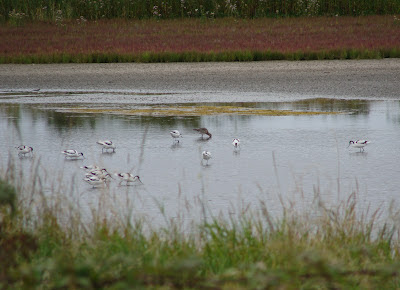 |
| RSPB Cliffe Pools, an Airport-free North Kent |
I was looking forward to yesterday. I really
felt like spending some quality time with the scope and bins, having the kind
of day where if I wanted to spend an hour contentedly scrutinising a
distant muddy pool, I could.
I haven't done the full circuit at Cliffe for a while, but it's really
one of my favourite places in the country I think. I guess it's a marmite site,
you love it or hate it. Sure, if you go for the birds, you need good optics
because they can be pretty distant in places, but there's always a chance
you'll get lucky. If you just want to get away for a bit, get pummelled by
winds off the Thames and stare at an expanse of
gloriously scruffy marshes, grazed fields, lagoons and ditches, then
it's a goldmine.
I fancied it yesterday, conditions were good - warm but
overcast, a slight (north) Westerly to start, and it turned out to be one of
the best day's birding I've had in ages.
I parked up and headed down the ash track for a bit before joining the
old sea wall to check Shrike field. A nice skein of two hundred or so Black-tailed godwits flew over and dropped dramatically into the far
pools but the field was just pigeons so I kicked through some rough towards the
hawthorn scrub. While I was checking the old
foundations for adders I saw a couple of birds flash from nowhere into a hawthorn nearby.
Looking over I could instantly see a smart looking female Common Redstart
perched on an outer branch. I got some nice views in the scope and a closer
look also turned up a Lesser Whitethroat, a Common Whitethroat, a Blackcap and
a pretty miffed Robin (which eventually pushed the Redstart out) all in the
same bush!
Round on Flamingo beach, it was still an hour or two before high tide so
it was quiet; but there were a handful of Ringed Plovers, one or two juvs and adults going into
winter plumage I think, a couple of terns and best of all, a ripping Bar-tailed
Godwit in full summer dress. Best I've seen. Nothing on the river and the back
track was quite too. I had hoped for Whinchat, but not this time. Nothing doing
at Cuckoo bush either so I carried on to the Black Barn pools.
I spent best part of a year working out here and this spot was always
one of the best. But for a lot of that time the pools were dry, they are much
less saline and rely more on groundwater reserves than the others. So it was
good to see them full (not surprising given our wet summer) and teeming with a
stunning range of wading birds. Redshank were most abundant, feeding alongside
Avocets, Lapwings and Black-tailed Godwits in the muted pinkish plumes of
post-breeders. A single Snipe waddled among them, preening
and scurrying for cover. On the near pool Dunlin and Ringed Plovers
mingled and inevitably a couple of Curlew Sandpipers popped
up amongst them. I was grateful for another birder giving directions
for a Little Stint, think it was only the second I've seen and I'd forgotten
how small they are! Best of all though came last. As a restless flock of
Lapwing switched pools, put up by a Hobby overhead, a Wood Sandpiper appeared with them and at possibly the
nearest point to me. It fed on its own, staying close to vegetation at the edge
of the pool, where it was joined by a Green Sandpiper. Never had those two in
one scope view before! It was my best views ever of Wood Sandpiper too, a really nice
little bird on its way south.
After that I was starving so decided to start the walk back. An
incredible flock of Avocets coloured the distant sky for a few moments, huge
numbers shifting off the Essex mud with the tide. It was a nice way to finish a great few hours birding.
Want to see a useless digiscoped effort of a Bar-tailed Godwit? Of course you do:
 |
| Bar-tailed Godwit (Limosa lapponica) Male in deep red breeding plumage. Note the extent to which it extends across underside, the thin, upturned bill and the squat posture in the water. |
Some more photos:
 |
| An excitably annotated pic of the Wood Sandpiper (and a Green Sandpiper's backside). What, you can't see it? It's right THERE. |
 |
| Avocets feeding in the shallows, a lone Black-tailed Godwit with them. |
 |
| Great Crested Grebe (Podiceps cristatus) starting to moult into winter plumage |
Pools:
Ringed Plover (6 rising to c50 on high tide later), Turnstone (6 briefly), Little Egret (10+), Oystercatcher (2), Bar-tailed Godwit (1), Black-tailed Godwit (c350), Common Tern (3), Black-headed Gull, Dunlin (2 rising to over 100 HT), Lapwing, Avocet (c1000), Snipe (1), Little Stint (1), Curlew Sandpiper (2), Green Sandpiper (3), Wood Sandpiper (1), Teal, Mallard, Wigeon, Shelduck, Ruff (14), Knot (2), Redshank, Spotted Redshank (4), Greenshank (2), Little Grebe, Great Crested Grebe, Coot.
Scrub:
Common Redstart (2 females - 1 in hawthorn bush between top of Flamingo and SSW, another later on bridleway close to Allen's Pond), Lesser Whitethroat (1 briefly in same bush as first Redstart), Common Whitethroat (2), Chiffchaff, Blackcap, Robin, Blue Tit, Great Tit, Reed Bunting, Woodpigeon, Collared Dove, Greenfinch, Chaffinch, Song Thrush (heard), Goldfinch, Starling (c200), Linnet (6), Wren, Magpie.
Elsewhere:
Hobby (1 over Black Barns before drifting and hawking dragonflies over river wall), Kestrel (1), Marsh Harrier (1), Sparrowhawk (1 female, across back track), Cormorant (multiple groups over), Pied Wagtail, Yellow Wagtail (1 over Flamingo, 1 later on BB3), Common Gull (19 on jetty), Herring Gull (1), Great Black-backed Gull (over), Meadow Pipit, Swallow (over pools throughout, generally moving south), Sand Martin (3), Jackdaw
No comments:
Post a Comment